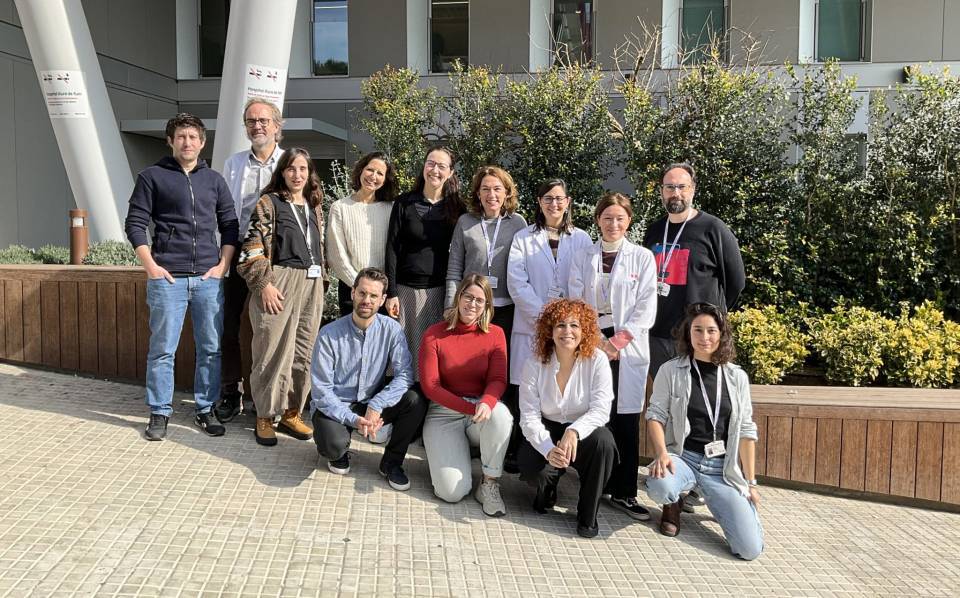When our body faces an infection by microbes such as bacteria or viruses, certain cells known as immune cells respond by producing an acute inflammatory response. Acute inflammation is therefore the body’s normal response to danger, allowing it to produce toxic substances to combat the infection. However, there are times when our cells may respond with excessive acute inflammation, causing more damage to the body than the infection itself, even leading to death. On other occasions, this acute inflammation is not resolved over time and becomes a chronic inflammation.
A study published in the journal Nature Communications has identified a gene called ZEB1 that regulates the inflammatory response to prevent excessive acute inflammation or its progression into chronic inflammation. This gene is found in one of the first immune cells to respond to infections: macrophages.
The research was led by Marlies Cortés, an expert in immunology and inflammation in the IDIBAPS research group Gene Regulation in Stem Cells, Cell-Plasticity, Differentiation and Cancer. Other members of the same research group participated in the study, as well as experts from the Rheumatology and Internal Medicine Services (Intensive Care Unit) at Hospital Clínic Barcelona.
The study shows that ZEB1 promotes the onset of acute inflammation in macrophages through the production of pro-inflammatory mediators, but also prevents inflammation from increasing uncontrollably by causing macrophages to enter a state of “non-response” of the immune system, with the production of anti-inflammatory mediators. This allows the body to recover and repair the damaged tissues to return to their normal state. This “non-response” of the immune system is crucial for avoiding an excessive inflammatory response. It can also be dangerous, however, leaving the body susceptible to secondary infections, which are frequent in hospitalised patients.
Our immune cells are capable of self-limiting nflammation by regulating their metabolism
To define this mechanism, the study used mouse models and human samples from patients with sepsis (acute inflammation) and psoriatic disease (chronic inflammation). The researchers identified the pro-inflammatory mediators that ZEB1 induces both during the inflammatory and anti-inflammatory phases. ZEB1 plays this dual role because it regulates the metabolism of macrophages, that is to say, how macrophages produce their energy.
During the inflammatory phase, ZEB1 increases macrophages’ glucose consumption and the production of lactate, which contributes to the start of the anti-inflammatory phase. ZEB1 also inhibits macrophages from capturing and consuming certain amino acids. The entry and consumption of amino acids in macrophages are essential for the formation of certain structures inside the cell known as mitochondria, which serve as the cells’ “powerhouse”. ZEB1 is involved in decreasing the entry and consumption of amino acids and therefore in the formation of new mitochondria, triggering the non-response phase of the immune system. As a result, it inhibits both uncontrolled acute inflammation and the subsequent evolution of inflammation intochronic inflammatory disease.
We can also help to keep inflammation under control fusing a widely used medication, Metformin, which uses this same mechanism to limit the inflammatory response and requires ZEB1 to control the metabolism of macrophages. However, as in all balanced systems, an excess of this non-response can leave the body vulnerable to other opportunistic infections.
“Our body uses inflammation as a protective measure, but it is also capable of self-liming from responding excessively to avoid possible damage to tissues and organs. Chronic inflammatory diseases, such as psoriasis, are an example of a failure to slow down this inflammatory response. However, this ‘self-limitation’ mechanism or non-response of the immune system can affect the ability to respond to new infections, as seen in many cases of patients with sepsis”, says Marlies Cortés. This study demonstrates that the mechanism of inflammation must be precisely regulated to avoid both an excess and a deficit in the inflammatory response.
The work reveals the role played by the ZEB1 protein in modulating the metabolism of immune cells in inflammation. As such, it may give rise to new strategies for treating acute and chronic inflammatory diseases like sepsis and psoriasis. “Knowing the genes and mechanisms by which our immune system regulates the inflammatory process is essential for designing new therapeutic strategies that can avoid the damage produced, either by an excessive inflammatory response or a deficiency in the body’s ability to combat new infections”, Cortés concludes.
The study was funded by various agencies, mainly by the Leo Foundation, the Catalan government’s Agency for University and Research Aid Management (AGAUR) and the Spanish Ministry of Science and Innovation (MICINN).
Article reference
Cortés, M., Brischetto, A., Martinez-Campanario, M.C. et al. Inflammatory macrophages reprogram to immunosuppression by reducing mitochondrial translation. Nat Commun 14, 7471 (2023). https://doi.org/10.1038/s41467-023-42277-4




